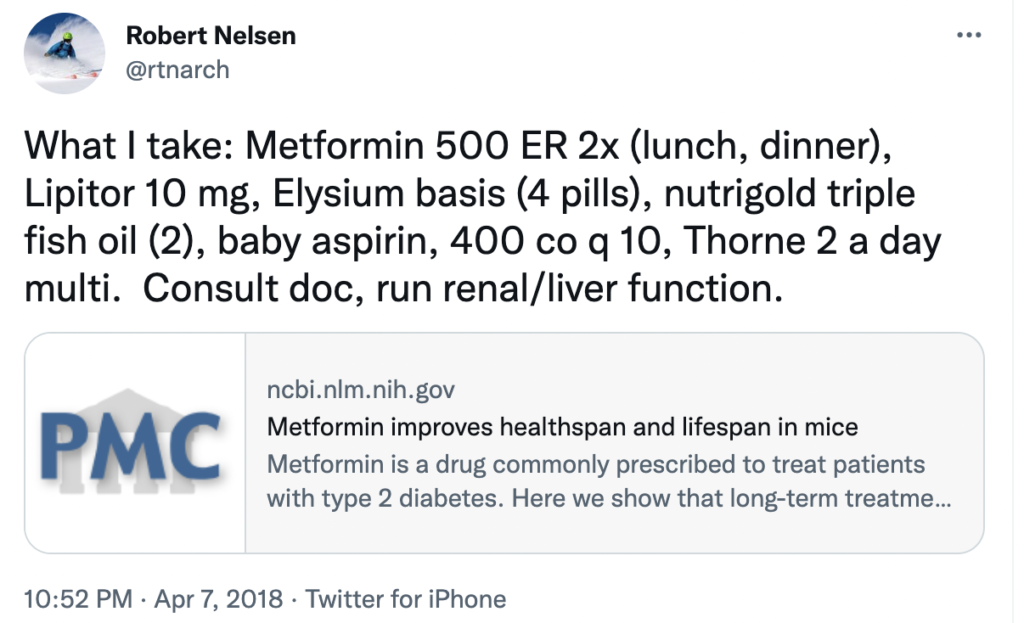This year, Metformin celebrates its 65th anniversary on the marketplace. In the US, it boasts the accolade of #6 most commonly prescribed drug (1).
Three generations of type-2 diabetes patients can tell some impressive stories about a drug remarkably efficient in reducing blood glucose levels and mitigating end organ damage due to hyperglycemia. Metformin is not only globally affordable, conveniently dosed, but also boasts a favorable safety profile that may even contribute to weight loss.
Can this story get any better? Well, yes. And that is the part of the story told by people like Robert Nelsen, Nir Barzilai, Ariel Poler, and other silicon valley and Hollywood celebrities from the new generation of healthy non-diabetic users of Metformin; biohackers who believe that Metformin can influence longevity. A bold approach to defeating aging that comes with concerns about the drug’s safety for healthy people. In this article, we try to answer:
- What is a safe dosage of Metformin for healthy people?
- What happens if you take Metformin and don’t need it?
#metformin #longevity #antiaging #supplements #metformin_safety
We have learned in a previous article how Metformin induces calorie restriction, regulates cellular aging, increases the activation of AMPK’s pathways, and ultimately reduces cellular senescence and aging remarks. But could these positive effects fire back in the rather odd cases of overdosing on Metformin?
Metformin Side Effects & Risks

Gastrointestinal disorders such as stomach pain, nausea, bloating, gas, and diarrhea are common side effects in about 25% of patients taking Metformin. Also, people have reported other unfavorable side effects like headaches, heartburn, and weight loss – the latter being a favorable side effect in most (3).
That said, the most feared side effect of high dose Metformin is lactic acidosis, which is a state of high acidity that overpowers the body’s natural buffering system. This is a dangerous, albeit rare condition, with fewer than 10 cases per 100,000 patient years (4). The physiology of this is not completely elucidated, but Metformin appears to mediate glucose to lactate conversion in the gut, as well as mediating mitochondria respiratory chain inhibition, thereby promoting anaerobic metabolism with lactate as a byproduct. All this is exacerbated in states of underlying kidney or liver disease, which is a major reason why physicians trend bloodwork while titrating doses.
Anecdotally, there appears to be a dose dependent relationship to Metformin toxicity. One reported poisoning case resulted from an extreme 45g ingestion that developed severe lactic acidosis, cardiac arrest, and pancreatitis (5). In animal models, a high dosage (400 mg/kg) – an inapplicable dose to humans – was deadly in mice (6).
Long-term use of Metformin might also result in dose-dependent Vitamin B12 deficiency and a higher risk for anemia and neuropathy (7), both of which are reversible or well managed with co-supplementation.
Adequate Metformin Doses For Healthy Individuals
In the United States, Metformin goes under either of these brand names: Fortamet, Glucophage, Glucophage XR, Glumetza, or Riomet. Studies have well validated efficacious dosing for type-2 diabetes patients, but optimal dosing for healthy patients is still a topic of debate. Physicians often start a 500mg daily to ensure tolerability and slowly titrate up to a maximum of 2000mg daily based on fundamental research in diabetic patients, but more creative dosing regimens are considered, including skipped days to allow mitochondrial healing and risk minimization.
Public Figures Taking Metformin Pills For Longevity
In his New York Times bestseller “Tools of Titans,” Tim Ferriss reported about dozens of experts who trust Metformin for longevity. The list of these experts includes:
- David Sinclair, Ph.D. – 1000mg per day
- Nir Barzilai, M.D. – 1500mg per day
- Ray Kurzweil – 500-850mg per day
- Jay Campbell – 1000-2000mg per day

In May 2016, Robert Nelsen, the venture capitalist of biotech, was interviewed by Forbes about his personal approach to longevity. Metformin was among an exciting cocktail of supplements he consumes daily, including Lipitor, B Vitamins, Vitamin D, and fish oil. Two years later, he wrote on his Twitter account that he upped his Metformin administration from one to two 500mg extended-release pills, and subsequently to three tabs daily by the end of 2020.
Dave Asprey, the iconic biohacker, used Metformin for longevity for about three years, but ultimately stopped due to concomitant B12 deficiency, a known and common side effect. For that specific reason, he touts using Metformin only two or three times a week with methylated B12.
Another biotech entrepreneur and biohacker, Ariel Poler, has reported in his interview with CNBC that he is not experiencing any side effects of taking Metformin. He mentioned discussing the published studies on Metformin with his physician before adding the drug to his daily routine.
Safe Approaches to Use Metformin For Anti Aging
Four strategies should be considered to optimize safety margins and get the most out of Metformin’s anti-aging properties (6):
- Co-Supplementation: Particularly Vitamin B12. Having B12 supplements taken along with Metformin is helpful to avoid nutrient deficiency.
- Intervals & Doses: Starting with reduced doses of Metformin is advisable while adding longer intervals between daily doses.
- Cocktail Therapy: Taking different complementary anti-aging drugs at once, each at a very low dose, instead of only Metformin, is a standard safe practice.
- Analogs to Metformin: Research is still ongoing to find safe analogs with fewer side effects. Mito-metformin, for example, may prove to be a good candidate when proved safe in clinical trials (9).
Final Verdict
When scientists first discovered the bonus anti-aging effect on type-2 diabetes patients, no one had expected that the discovery would lead to a trend of off-label usage of Metformin for longevity.
The decision to start metformin for primary anti-aging benefits should be based on a balanced review of pros & cons, personal safety concerns, and long-term goals in discussion with your physician. Off-label use means that FDA clearance isn’t yet there, which is a common theme of biohacking given how rapid science and technology are growing.
A controlled risk-benefit analysis should always include data acquisition, and I strongly recommend those interested in off-label use of metformin to monitor objective and subjective parameters. Controlled risk is the core of biohacking.
If you are about to take Metformin, I advise you to follow these guidelines as the review of recent studies and personal practices prove to be valid:
- Talk to your physician first: to make sure you are safe for this experiment and that no conflicts exist with other medications.
- Start at low doses of extended-release pills, or take immediate release formulations with meals.
- Gradually increase: Start at one 500mg 3 days a week for the first month, then 1000mg three days a week for the second month. If you feel well, with no serious side effects, consider targeted escalation.
- Test-Take-Repeat: Biochakers love testing, and this is 100% encouraged here. Firstly to monitor safety parameters in the setting of off-label use, but remember that the primary end point here is not A1C so the end points are more subtle. Also consider monitoring B12 levels, lactic acid, inflammation markers, vitals signs including weight, and subjective markers such as how you’re feeling. Advanced approaches may include measuring the protein levels of LC3-II to track autophagy activity and tumor marker tests.
- Complement with supplements & a healthy lifestyle: Best practices advise taking B12 supplements along with Metformin. Add other safe supplements to such a cocktail, including omega-3 fish oil supplements and vitamin D. I won’t forget to mention that all of that is never a substitute for a healthy lifestyle where you exercise regularly, control stress levels, eat a balanced diet, and have a quality sleep pattern.
- Tell the world your experience: Keep learning, spread the word, and keep your ears and eyes open. Every week, scientists publish some new papers on longevity. Expect more research results, breakthroughs, and new insights about Metformin and other biohacking techniques to pop up in the following years. One good tip is to stay tuned for our following articles to keep track of all of that.
Al Feky, Staff Writer @ Montecito Concierge Medicine
Scientific Writer I Health & Nutrition Life Coach
References
(1) https://www.visualcapitalist.com/ranked-the-most-prescribed-drugs-in-the-u-s/
(2) https://link.springer.com/article/10.1007/s00125-017-4343-y
(3) https://www.nhs.uk/medicines/metformin/side-effects-of-metformin/
(4) https://www.sciencedirect.com/science/article/pii/S0026049515003066
(5) https://www.ncbi.nlm.nih.gov/pmc/articles/PMC3106398/
(6) https://onlinelibrary.wiley.com/doi/10.1002/agm2.12135
(7) https://journals.plos.org/plosone/article?id=10.1371/journal.pone.0100379

